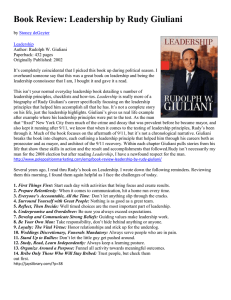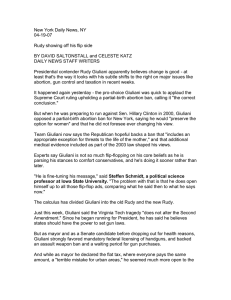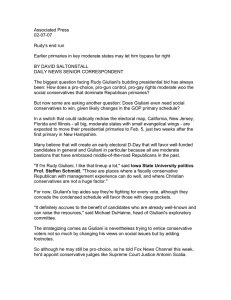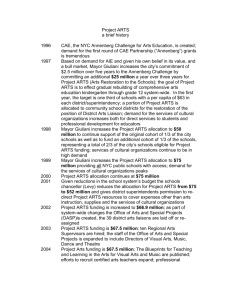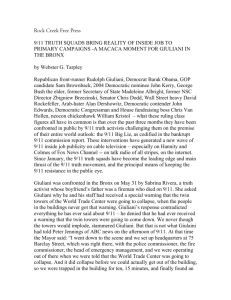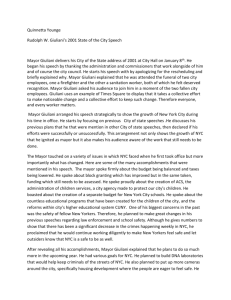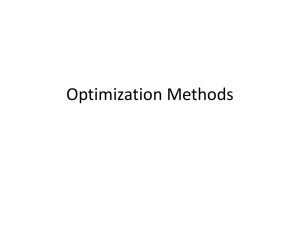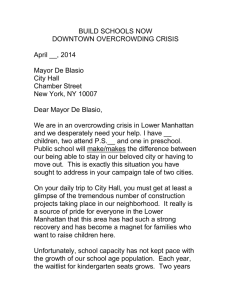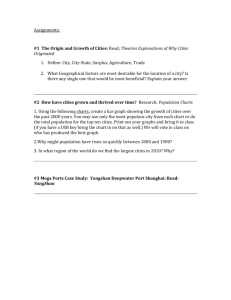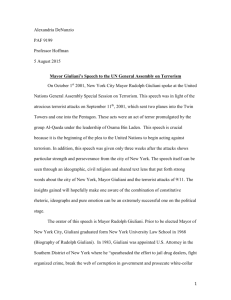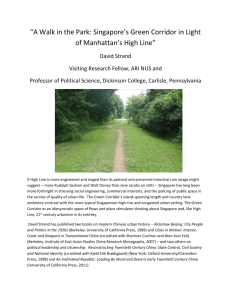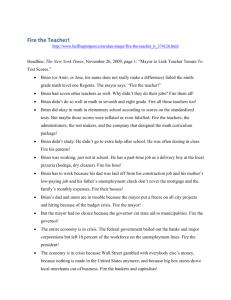C70127
advertisement
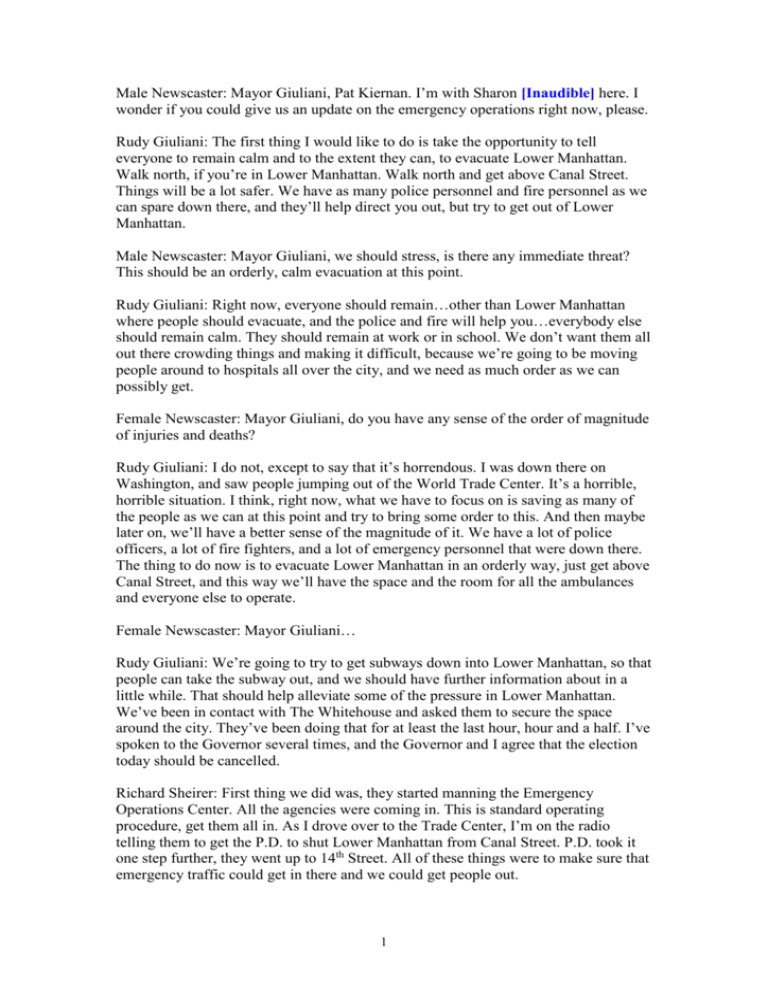
Male Newscaster: Mayor Giuliani, Pat Kiernan. I’m with Sharon [Inaudible] here. I wonder if you could give us an update on the emergency operations right now, please. Rudy Giuliani: The first thing I would like to do is take the opportunity to tell everyone to remain calm and to the extent they can, to evacuate Lower Manhattan. Walk north, if you’re in Lower Manhattan. Walk north and get above Canal Street. Things will be a lot safer. We have as many police personnel and fire personnel as we can spare down there, and they’ll help direct you out, but try to get out of Lower Manhattan. Male Newscaster: Mayor Giuliani, we should stress, is there any immediate threat? This should be an orderly, calm evacuation at this point. Rudy Giuliani: Right now, everyone should remain…other than Lower Manhattan where people should evacuate, and the police and fire will help you…everybody else should remain calm. They should remain at work or in school. We don’t want them all out there crowding things and making it difficult, because we’re going to be moving people around to hospitals all over the city, and we need as much order as we can possibly get. Female Newscaster: Mayor Giuliani, do you have any sense of the order of magnitude of injuries and deaths? Rudy Giuliani: I do not, except to say that it’s horrendous. I was down there on Washington, and saw people jumping out of the World Trade Center. It’s a horrible, horrible situation. I think, right now, what we have to focus on is saving as many of the people as we can at this point and try to bring some order to this. And then maybe later on, we’ll have a better sense of the magnitude of it. We have a lot of police officers, a lot of fire fighters, and a lot of emergency personnel that were down there. The thing to do now is to evacuate Lower Manhattan in an orderly way, just get above Canal Street, and this way we’ll have the space and the room for all the ambulances and everyone else to operate. Female Newscaster: Mayor Giuliani… Rudy Giuliani: We’re going to try to get subways down into Lower Manhattan, so that people can take the subway out, and we should have further information about in a little while. That should help alleviate some of the pressure in Lower Manhattan. We’ve been in contact with The Whitehouse and asked them to secure the space around the city. They’ve been doing that for at least the last hour, hour and a half. I’ve spoken to the Governor several times, and the Governor and I agree that the election today should be cancelled. Richard Sheirer: First thing we did was, they started manning the Emergency Operations Center. All the agencies were coming in. This is standard operating procedure, get them all in. As I drove over to the Trade Center, I’m on the radio telling them to get the P.D. to shut Lower Manhattan from Canal Street. P.D. took it one step further, they went up to 14th Street. All of these things were to make sure that emergency traffic could get in there and we could get people out. 1 Frank McCarton: Our responsibility as an Emergency Operations Center is to coordinate any large disaster in the city. The Mayor created that particular agency back in 1996. It was written into our plans that I would request from every single agency a public information officer from the Sanitation Department to the Health Department to the Fire Department to the Police Department. I was empowered by the Mayor’s Office to call all these press officers in, and put a schedule in that was 24/7, and tell them that they all worked for me. You drop your agency at the door. You now work for the Office of Emergency Management. You work for the city. And I never saw a bunch of more dedicated, charged individuals than I had working for me. Richard Sheirer: Once the second plane hit, I was calling up to my people to get hold of the State Emergency Management Agency to have the Air National Guard to get some planes up over New York. They did that, and then I directed them to call The Pentagon directly, to the people we work with in the Department of Defense. That’s when I learned that the Pentagon had been hit, because they learned that when they called there. So, there were so many things going on, and you’re trying to think through, you have so many balls in the air, but you just have to keep your composure, and go through it real quickly and analytically what you need to do next. Frank McCarton: It was a moment in which, it was really uncertain what occurred. And I think we knew when the second plane hit that we did have a problem that was larger, I think, than anyone would sit there and imagine, or would be able to think about. My job was to think about communications in disasters that we’d though about. I mean, we’d though about disaster planning in coastal storms, we’d thought about disaster planning in biological terrorism, we’d thought about chemical terrorism, we’d thought about power outages, which was a huge story last year in the summertime. We’d thought all about that stuff. But I think the magnitude of this was just unbelievable. Rudy Giuliani: And then, we went into Barkley Street, 75 Barkley Street, I think it was, and we were there when the building collapsed, and it collapsed, in part, on 75 Barkley Street, so we were trapped in the building for maybe 10 or 15 minutes, trying to get out different exits, and we finally went through a basement and came out 100 Park Place. Frank McCarton: I left 1 World Trade Center, the command post in 1 World Trade Center, and met up with my boss, Richard Sheirer, and the Mayor, Mayor Giuliani, at 75 Barkley Street in the temporary command post that we were going to use. We were going to put together a press conference because it was very important for the Mayor to speak about what was occurring in the city, to get the most up to date information out to the citizens of New York and the world. Richard Sheirer: The Mayor had us going north, away from the Trade Center, and as we were going north, the second building came down. Our thought was “what next?”, “how many people did we lose?” I don’t think any of use envisioned these buildings coming down. We envisioned a very significant fire, a very significant loss of life, but never did we think that it would come down the way it did. Frank McCarton: How did we cope? We dealt with it, we ran with it. There was no freelancing, we all knew who the boss was in our office, and we got the job done. 2 Richard Sheirer: We had pre-planned sets for various emergencies, from coastal storms to blackouts, to heatwaves, and what we did was, without going to those books, because those books were no longer available, because our building went down that night…everybody knew those plans backwards and forwards. We picked pieces of each plan and melded it together. It’s being flexible when you need to be flexible, and that’s what we did. Rudy Giuliani: And our focus now has to be on saving as many lives as possible. We have hundreds of police officers and firefighters who are engaging in rescue efforts in Lower Manhattan. There are over a thousand rescue workers, probably 2 thousand, deployed, trying to find people, trying to search for people. Richard Sheirer: We could not have managed this disaster, from the time of the attack till now, without having these various agencies together in one location where they can communicate with each other, where if you need a resource, it’s right at hand, where you don’t have to search people out. Rudy Giuliani: I commend the Commissioner. He was on the phone a number of times with us, he coordinated very, very carefully what would happen, he thought it out and came up with a very good plan, which was essentially to keep the schools open, to keep the children in school, so that we didn’t have a large number of children in the different boroughs that would be released from school. They are being released, I shouldn’t say “as normal”, but basically on the normal schedule. If parents aren’t there to pick up the young children, then the children will be taken to a center and the parents will be notified to come and pick them up. Richard Sheirer: By us being able to do our jobs and reporting to him, and giving him our expertise, a picture of what’s going on, he’s able to address the whole picture, without being concerned of a point of weakness. The Mayor is probably the most hands-on administrator I’ve ever worked for. And hands-on in such a positive way because he’s so knowledgeable. He’s a Mayor who wants you to come to him and tell him what is, not what he wants to hear, but what is. He demands that. And that makes him effective. As we were making decisions, he was right in the heat of it, and he brings a perspective to it, of the entire city. We all have our backgrounds, but he is the leader, and he is our leader. He’s looking at things from every way, and it really brings breadth to what we do. PART 2 Rudy Giuliani: Today is obviously one of the most difficult days in the history of the city and the country. The tragedy that we’re all undergoing right now is something that we’ve had nightmares about, and probably thought wouldn’t happen. Chris Vlasto: Giuliani became a hero because the first person America saw was him. America heard from Rudy Giuliani, not the President of United States, not Dick Cheney, they heard from him. So, everyone was gripped to any word he’d say. Andrew Kirtzman: You have to remember that on the morning of September 11th, George W. Bush was out of commission for a long time, out of communication. He 3 was in a plane on the way to a secure location. And it was really Rudy Giuliani who the country watched and listened to as he tried to reassure people that everything was going to be OK. I think that image was really burned into the psyche of the American people. I think the public needed a savior from this trauma, and I think the press hit on Giuliani and decided he was that person. Rudy Giuliani: And we will strive, very hard now, to save as many people as possible. And to send a message that the city of New York and the United States of America is much stronger that any group barbaric terrorists, that our democracy, that our rule of law, that our strength and our willingness to defend ourselves will ultimately prevail. Chris Vlasto: The beast of the media needed to be fed. No one was feeding us except the horrible chaos around us, and then when, finally, he came out, stable, telling us what it was, being direct about what it was, that’s where he was effective. Everyone stopped working in the newsroom. You know, we all became citizens. Andrew Kirtzman: Giuliani’s strength is that he’s very direct and he’s very frank. And I think that’s why the American people were so taken by him on September 11th, because he was speaking so honestly and he was leveling with the American people. Brian Lehrer: He did set, so the right tone, at the beginning. Rudy Giuliani: The number of casualties will be more than any of us can bear, ultimately. I don’t think we want to speculate on the number on casualties. The effort now has to be to save as many people as possible. Brian Lehrer: His media strategy, in general, was prosecutorial. He would tend to come on and accuse people who disagreed with him on an issue of all manner of things. And in this case, there was nobody to accuse, other than the people who we all thought should be accused, whoever the terrorists were who committed this act. Rudy Giuliani: I want the people of New York to be an example to the rest of the country and the rest of the world that terrorism can’t stop us. American democracy is much stronger than vicious or cowardly terrorists. And we’re going to overcome this. Brian Lehrer: I think it helped him tremendously to rally everybody behind him that he was one of very first to speak out about the need not to discriminate against Arabs and Muslims in the city. Rudy Giuliani: Hatred, prejudice, anger and irrational reactions to things are what caused this terrible tragedy, and people of the city of New York should act differently. We should act bravely, we should act in a tolerant way, we should go about our business and we should show these people that they can’t stop us, and they can’t. Chris Vlasto: Rudy Giuliani showed that a guy who’s not really a great communicator, he’s not…he kind of has a lisp, he’s kind of gruff…he showed that by action and by doing and being…those pictures, he was a leader through the pictures, they were worth a thousand words, they were worth a thousand speeches – him walking in the rubble was showing great leadership. He wasn’t sitting in an ivory tower, just dictating what other people should do, he’s there doing it. You couldn’t not be 4 impressed by that. He was getting his hands dirty, he was gritty, and I think that for New York, that’s the perfect kind of thing. Brian Lehrer: I think they needed a lot of what Mayor Giuliani provided, which was the combination of telling people that he and his government were in control and were taking the measures needed to protect us. We’re in control, you can be in control, and yes, there is really something to fear out there, but here’s what we have to do now, let’s just keep it together. William J. Bratton: In dealing with crises, he is a role model. Not only in that event, but I’ve seen the Mayor, in many instances, one during the time I worked with him as Police Commissioner, where his approach to dealing with crises was excellent. He was really…it’s almost as if he was born to deal with them. And he understands the importance in the public arena of being calm, being informed, of showing the right degree of compassion, as well as strength. Brian Lehrer: We needed the sense that the Mayor cared about us, and wasn’t cold and detached at this time, and he obviously was expressing a lot of compassion. Rudy Giuliani: This is a horrible thing that has happened. It’s a terrible thing. I don’t think we understand yet the full dimension of how this is going to affect us, the loss of life that has taken place. The reality is, we’re going to go on with our lives, the city is here, it’s functioning. There are millions of people here, they are safe, and they should go about their lives now, they should go to stores, they should go to restaurants, they should do the things they normally do, and we’re going to work really hard to get the city focused in that direction. Thank you. Frank McCarton: And I go back to those first 2 days, in which the question was asked, “What do you think we should do Mayor Giuliani?” And he said we need to go back to our lives. That’s a gutsy answer to give after the United States was just attacked. Rudy Giuliani: I’m going to a wedding today, which means a great deal to me, because it’s the wedding of the sister of firefighter Garumba, who died three weeks ago in the line of duty, Diane Garumba, and police officer Michael Farrito. In the course of the last year, Diane lost her grandfather, her father and her brother, and therefore had no one to walk her down the aisle, and Mrs. Garumba asked me to do that several weeks ago at the wake. So, at three o’clock this afternoon, I’m going to take time out to go to a wedding. And I have thought very often in the last couple of days about Mrs. Garumba’s advice at her son’s wake, when I found out that she had lost her father, her husband and her son in the course of 12 months. I asked her how she can bear it, and she said because she feels the pain of it, she allows the pain to happen, but then she focuses on the good things that are left in life, like her daughter’s wedding. And that’s what you have to do, she said. You have to focus on the good things in life, and you have to go and participate in the good things. Frank McCarton: And I believe if we go back in history, Winston Churchill said the same thing. That is leadership. Telling people to go back to their own lives. Rudy Giuliani: I encourage people to put this incident into perspective. We’re not the first people that have gone through being attacked, there are a lot of examples of it. 5 I’ve been reading about Britain during the Battle of Britain, and I recommend that people do that. That or other things that put in context the fact that civilizations have been attacked, democracies have been attacked, and they’ve had the strength, the courage and the will to deal with it. I’m reading this book “Five days in London”, which explains some of the decisions that were made to resist the Nazi bombing of London in 1940 and 1941. Nothing is more inspirational than the speeches and reflections of Winston Churchill in how to deal with that. William J. Bratton: Winston Churchill was a great wartime leader, but literally, as the war was coming to a close, the British public voted him out of office. Giuliani could be argued as a great leader in crises, but when he doesn’t have crises to deal with, he starts getting into trouble. Andrew Kirtzman: There came a point in the Rudy Giuliani saga at which he stopped doing anything extraordinary, but the public acclaim just snowballed. So, he went from decisive leader to heroic leader to rock star to demi-god, and the press was totally responsible. Brian Lehrer: All the problems in his personal life that reflected badly on him with the general public, lingering problems after the Amadu Dialo shooting, and the ways he did not bring the city together after that certainly had taken their toll. And he was going to go out of office as someone who had a reputation of doing one thing really well, which was to have brought down crime early in his administration. And now, he was “America’s Mayor”. Andrew Kirtzman: It was a brilliant move of Giuliani as he marched up 6th Avenue to try to find a place to relocate city government, and try to calm the public, I think he used a good old Rudy Giuliani instinct to have the press watch him in action. And I don’t think that changed after September 11th, I think there was so much more media demand for him, that was able to kind of pick and choose his interviews going all the up to the biggest network stars. Brian Lehrer: After a point, I had people calling in to say, yes, he’s been very good in this, but let’s put in perspective. This is the kind of thing that he’s always been the best at, this was a unique crisis situation, in the city’s, even the country’s history. But he’s still the same guy with all the shortcomings that he had in the past, as well as all the strengths, and let’s not canonize him, let’s not put him on a pedestal. Especially as he was about to go out of office. Andrew Kirtzman: Giuliani has been hailed since that day as a hero, and strictly speaking, he’s not a hero, he didn’t save anyone’s life, he didn’t put himself in physical danger, when he knew there was danger, although it turned out there was danger. What he was, was a leader. He was able to rally the spirit of the city, he was able to take control of the various rescue operations, emergency operations, he was decisive, and he was inspiring. Chris Vlasto: Rudy, I think, took us along the way. He told us what he knew, what he didn’t know, what people should be doing. I mean, he was telling people, telling the chief of police, the firemen, he was running the whole enterprise. I also think it’s 6 easier for a Mayor to do that the President of United States, because he’s on the street with the people. William J. Bratton: Many of his strengths were exemplified, were expanded upon, during this crisis. The leadership skills, the extraordinary ability to deal with crises, the ability to project calmness in the face of catastrophe, the ability to lead and coordinate, and some of the character traits caused dislike by many in the city are still there, but nobody’s perfect. Nobody’s perfect. 7
